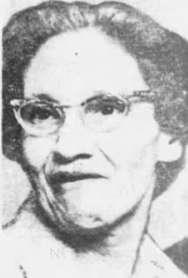Sarah A. Anderson
Sarah A. Anderson (January 23, 1901 – December 9, 1992) was a Democratic member of the Pennsylvania House of Representatives.[1][2] An "advocate for the rights of children, minorities, women and the impaired during her 17 years in the state House of Representatives," according to her obituary, she was also "the first black woman to preside over the General Assembly and serve as chairwoman of the Health and Welfare Committee."[3]
Sarah A. Anderson | |
|---|---|
 | |
| Member of the Pennsylvania House of Representatives from the 193rd district | |
| In office 1969–1972 | |
| Preceded by | District created |
| Succeeded by | Donald W. Dorr |
| Member of the Pennsylvania House of Representatives from the Philadelphia County district | |
| In office 1955–1968 | |
| Personal details | |
| Born | January 23, 1901 Jacksonville, Duval County, Florida |
| Died | December 9, 1992 (aged 91) Philadelphia County, Pennsylvania |
| Political party | Democratic |
| Spouse(s) | Dr. A. W. Anderson, Sr. |
| Occupation | Pennsylvania State Representative |
Background
Born in Jacksonville, Florida on January 25, 1901, Anderson was a daughter of Dr. Harry Anderson, the first practicing black dentist in Florida. She graduated from the Philadelphia High School for Girls and Philadelphia Normal School.[1][3]
Professionally, she then became an elementary school teacher in the Philadelphia public schools.[1]
Public service and political career
A member of the 30th Ward Democratic Committee, she also served as an inspector for the Philadelphia Elections Board, as a member of the 44th Ward Executive Committee, as a judge for the 24th Division Election Board, as a member of District 1 of the Democratic Executive Committee, and as a legislative consultant for the United States Department of Veterans Affairs.[1]
A Democrat, she was elected to the Pennsylvania House of Representatives for the 1955 term, serving for a total of nine consecutive terms.[1] She became known as an "advocate for the rights of children, minorities, women and the impaired during her 17 years in the state House of Representatives," according to her obituary, and also became "the first black woman to preside over the General Assembly and serve as chairwoman of the Health and Welfare Committee, a post she held for four years."[3] As chair of the Health and Welfare Committee in 1970, she was at the center of debates about legalizing abortion in Pennsylvania.[4][5]
In 1956, she was an alternate delegate to National Democratic Convention; in 1960, she was elected as a delegate to the National Democratic Convention. She then also served as an appointed member of the: Commission on Philadelphia School Charter, Pennsylvania Historical and Museum Commission, Governor’s Commission on the Status of Women, Governor’s Council on Drugs, Governor’s Task Force on Human Services, and State Advisory Committee on Mental Health/Mental Retardation.[1]
She opted not to stand as a candidate for reelection to the House for its 1973 term, retiring instead in 1972.[1]
Accomplishments and legacy
Anderson secured the passage of legislation which made kidney dialysis services accessible in underserved communities via the use of mobile units, helped raise awareness regarding sickle cell anemia, helped secure the passage of legislation to increase funding for mental health treatment services, and supported efforts which helped improve the quality of life for blind and visually impaired residents across Pennsylvania. In 1963, she played a key role in the establishment of the junior college which ultimately became the Community College of Philadelphia. In 1965, she sponsored a fair housing bill.[3] In 1972, she was honored by the Pennsylvania Commission on the Status of Women, for her sponsorship of the Pennsylvania Equal Rights Amendment and other efforts for women's rights in the state.[6]
Death and interment
A resident of West Philadelphia during her final years, Anderson died on December 9, 1992 in Philadelphia, Pennsylvania, and was interred at the West Laurel Hill Cemetery in Bala Cynwyd, Pennsylvania. She was preceded in death by her husband, Dr. Adolphus W. Anderson, Sr., a podiatrist.[1][3]
References
- "Sarah A. Anderson" (biography). Harrisburg, Pennsylvania: Pennsylvania House of Representatives, retrieved online July 12, 2019.
- Cox, Harold. "House Members A". Wilkes University Election Statistics Project. Wilkes University.
- Nicholson, Jim. "Sarah Anderson, 91; ex-PA representative." Philadelphia, Pennsylvania: Philadelphia Daily News, December 11, 1992.
- Antosh, Lou (July 24, 1970). "Election-Year Politics Kills Pa. Abortion Bill". Philadelphia Daily News. p. 5. Retrieved July 12, 2019 – via Newspapers.com.
- "Catholic Nurses See Abortion as Legalized Murder". Republican and Herald. October 1, 1970. p. 1. Retrieved July 12, 2019 – via Newspapers.com.
- "Legislator Honored on Women's Rights". The Oil City Derrick. November 27, 1972. p. 9. Retrieved July 12, 2019 – via Newspapers.com.